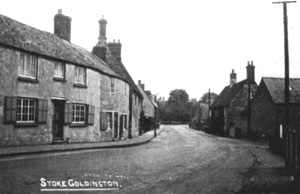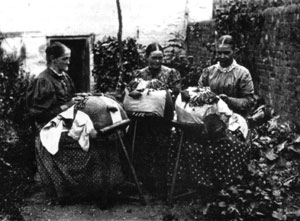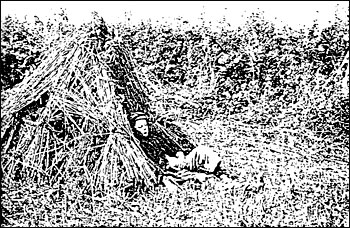Time and time again my mother would pack her bags and "go home to mother", and my father was only too willing to gather his photographic equipment together, leave the City behind and accompany her. That happy state of affairs applied both before and after marriage, and it is because they were able to continue making Stoke Goldington the venue for their regular holidays, even while they were raising a family, that after the passage of sixty years those August holidays remain, for me, something special.
Being the third in line of family arrival dates (I was born in 1899) it could be said that by August 1914 I had enjoyed at least twelve memorable consecutive visits to Stoke Goldington, each covering the entire month of August. In retrospect those months form a year of perpetual sunshine and warmth - for how soon we are apt to forget the grey patches which surely occur as nature wills.
It so happened that at the turn of the century my father accepted an appointment in Leeds, doubtless a difficult decision for a man with a young family and himself one of a large family strongly rooted in London. However, judging by future events there could have been little cause for regret; certainly we juniors took to our new environment with ease, and thereafter soon assumed the roles of pseudo "Yorkshire Tykes"! It was from these Broad Acres then, Ripon and Harrogate in particular, that my truly unforgettable journeys to Buckinghamshire really began.
By mid-July my mother could be found busily gathering together numerous items of clothing, and transferring them to the family sized tin trunk which always formed the main item of luggage. This task must have called for a considerable amount of ingenuity on her part, deciding just how to cater for the needs of so many for so long a period, and at the same time maintaining a margin available for use up to the date of departure. Maybe she enjoyed doing it, though one thing is fairly certain, there would be little practical help from my father for he would probably he concentrating on preparing his photographic equipment!
Saturday, our regular departure day, dawned at last. Saturday being one of the few days transport was available between Northampton and Stoke Goldington. Breakfast had little appeal that morning, we were too excited and all agog until the arrival of the cab that was to take us to the station. Once there and settled aboard, the long journey commenced and, not surprisingly, what had for many days been a splendid prospect slowly began to lose some of its glamour and we started to tire as the day wore on. However a couple of breaks, usually at Leicester and Kettering, brought us back to life again and with much hustle and bustle we located the next train and transferred our belongings.
In spite of these enforced "breathers" there was a general sigh of relief as we finally pulled into Northampton station and were able to stretch our Iegs once again. Here we usually found time to visit the market --- and I seem to remember visiting a penny bazaar too - then after some welcome refreshment we made for the assembly point from where the final stage of our journey began: that novel eleven miles in cheerful Charlie Clark's Carrier Van drawn by two somewhat weary looking horses, a veritable Dickensian type of covered wagon.
Sure enough there he was, all smiles and prompt with his usual friendly greeting: "Hello, you Yorkshire Tykes here again", his slow measured tones contrasting strangely with the northern accent we had left behind. Then with passengers settled round the bench-like seat (actually a locker) and luggage secured, we made a leisurely start, down Bridge Street, along by the breweries with their characteristic smell, then up the hill past Queen Eleanor's Cross and out into the open country towards Buckinghamshire's northern boundary.
 |
|
The Godfrey Sisters Cottage
|
Our feelings were I suppose not unnatural, for we had been on the road most of the day and the remaining milestones seemed further and further apart; but though sorely tried, our patience was finally rewarded, for there on the skyline rising above the hedgerows to our right, the village church at last came into view.
Weariness vanished as we descended the hill and passed the places which were becoming more familiar to us as year followed year, Mount Pleasant; Roddis's Farm; the Rectory: the White Hart; the Reading Room: Sawbridge the Butcher; Whiting's; Uncle John's thatched cottage; Clarabut's shop, each landmark bringing us nearer to the double-fronted cottage that was to be our home for the weeks ahead. Here the door was already open, the family group waiting on the cobblestones outside, and no sooner had we scrambled down than greetings and hugs were being exchanged on all sides. Dusk had already fallen and the oil lamps lit, and after a very welcome supper we were only too pleased to accept the proffered candlesticks and make our way to bed.
Readers may already be familiar with the Godfreys, from earlier articles (See The Godfrey,s of Stoke Goldington). The eldest of the four sisters, Elizabeth, my grandmother, had by her marriage and calling more than the average amount of experience with children, and there is little doubt that her maiden sisters, Sarah, Mary and Esther, would have made equally good mothers. Under the one roof it meant that, in effect, we Barton juniors had the love and devotion of five "mothers", a situation which may well have proved unsatisfactory for all concerned, but happily and greatly to their credit a very successful balance between discipline and freedom was maintained. We probably gave little heed to the fact that daily catering for a family of ten would present problems and involve our "mothers" in much extra work. However, by enlisting our help - tactfully no doubt - we also gained, fo r it was always a pleasure to fetch milk from the farm; pick and shell peas; gather fruit and vegetables from the allotment; collect wood and chop sticks.
 |
|
The Godfrey Sisters
|
The novelty of farm life, particularly at harvest time had an appeal we just could not resist and, with an uncle, Jesse Green, employed as right-hand man on the farm of John Roddis, we were able to take full advantage of his experience and willingness to allow us to join him and play a small part in the daily routine. Many happy hours were spent around the farmyard with its barns, stables, out-houses and dairy, not to mention all the other various items associated with agriculture. Then off to the fields where harvesting was in full swing, and what a picturesque scene it presents. The rotating arms of the latest reaper/binder drawn by a team of magnificent horses being steadily guided round and round the perimeter, while suntanned open-shirted farm hands and we helpers followed closely behind, bent on picking up the ready bound sheaves and arranging them to form stooks. Further excitement followed as cutting proceeded and the rectangle of standing wheat became smaller and smaller forcing the scared rabbits to seek fresh cover and safety elsewhere, only to fall easy prey to the group waiting nearby with shotguns at the ready. We - hopefully and hopelessly - shied stones!
Modern harvesting methods have surely taken some of the romance out of what always seemed to me to be a most pleasurable experience. The noble horses have been retired and a huge machine now takes over, transforming in one operation the sea of golden corn into trailer loads of grain and symmetrical bundles of straw. That is progress, whereas reaping in my day left row upon row of shocks (or stooks) each comprising about twelve sheaves. Subsequent threshing took place either on site or at the farm, in which case our sole aim was to obtain as many joyrides between field and farm as possible, and in doing this I suppose it could be said that we were enacting the closing lines of that ancient but locally popular Moody/Sankey harvest hymn: "Here we come rejoicing, bringing in the sheaves". The special carts used for this purpose had supplementary outboards fitted to increase their carrying capacity, but they were hardly designed for comfort!
This recalls an incident when, at the close of a long hot day I was persuaded to accept a lift on the back of one of the farm horses. Once aloft my young legs were so widespread that I could not possibly grip with my knees and, feeling very insecure I was only too pleased to be lifted down to earth once again. The roughest ride of all, however, was during ploughing operations, and I was permitted to sample the journey across the field of stubble on the "captive" plough running on the steel cable which was stretched between the two smoke-belching steam engines, one on either side of the field. No such method exists today but the thought of it, no cushion on the seat, still makes me feel uncomfortable!
The harvesting of brambles, nuts, mushrooms, sloes, hops and crab apples, were occasions for family outings and picnics, and the fruits of these happy gatherings, after suitable treatment, doubtless went to supplement the winter supplies.
Many of these hot, action filled days were followed by warm sultry nights, but before sleep claimed us we were frequently treated to a most fascinating display of summer lightning, a phenomenon comparatively rare today, for something has happened during the intervening years the experts seem undecided just what and these atmospheric electrical discharges appear to have found some less spectacular path
